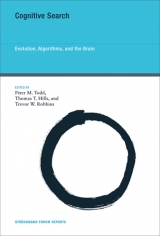Background and Significance of the Topic
Search is a common and crucial behavior for most organisms mediating the trade-off between exploration and exploitation of resources distributed in space or time. The literature of search behavior is largely spread over multiple disciplines and paradigms, ranging across foraging for food, visual search for targets, drug-seeking behavior in addicts, memory search in recall and recognition tasks, the search for information on the web, and the search for mates in social environments. Recent molecular and comparative biological findings support a putative common ancestral precursor for many of these search behaviors in animal foraging. Moreover, with our developing understanding of the shared control among neural correlates of response selection (prefrontal cortex and basal ganglia), exploration and memory (e.g., the hippocampus), and visual attention (e.g., the parietal cortex), so grows the increasing realization that numerous goal-directed processes central to cognition rely on the integration of search-related architectures. This leads to the surprising conclusion that the same processes may underlie much of human behavior—when characterized as cognitive search—both in the external world and in internal memory (reviewed in Hills, 2006).
Search behavior is moving to the forefront of scientific inquiry in a number of fields as a result of several recent findings and methodological developments, including the following:
- The discovery of dopaminergic mechanisms across multiple species that control the search for and evaluation of resources.
- Characterizations from network science of large-scale mental spaces (such as lexicons) and social spaces (such as friendship networks), which provide terrains for modeling search behavior in those domains.
- Extension of the principles of adaptive foraging to the exploration of human decisions in information environments such as the World Wide Web.
- Multidisciplinary interest in the trade-off between exploring for and exploiting found resources and the development of cognitive models to characterize these behaviors and their dynamic interplay.
- Developments in genetic analysis and neuroimaging that have shown the importance of individual genetic differences and specific brain regions (e.g., prefrontal cortex, striatum, hippocampus, and parietal cortex) for understanding human explore/exploit decision making in a variety of environments.
Search, as a behavioral process, is so common that it is constantly being reexamined and redefined by various disciplines; however, these disciplines often act independently of one another in their scientific endeavors. The primary goals of this forum will help us approach collectively, and work to overcome, what we perceive to be this interdisciplinary blind spot in the study of human and animal cognition. Although the fields that compose cognitive science have each furthered our understanding of cognition at various levels of analysis, the combined success of these endeavors has contributed to a modular view of the mind, composed of separate processes independently evolved to solve specific problems. Little attention has been paid to how the processes may share similar algorithms, neurocognitive control systems, or arise from a common ancestry. At the same time, individual fields have found exactly these commonalities among search processes. For instance, cognitive neuroscience has explored how interactions between the striatum and prefrontal cortex modulate a diversity of goal-directed behaviors, involving similar molecular machinery, and handling problems as diverse as spatial search for a target and abstract decision making. Moreover, studies of adaptive spatial, information, and social foraging find remarkably similar theoretical descriptions of behavior across mental, spatial, and social domains.
This Ernst Strüngmann Forum offers the unique opportunity for members of various disciplines to identify the commonalities and distinctions among cognitive domains related to search, as well as to identify possible future directions for investigating common molecular and evolutionary origins of human goal-directed cognition. In doing so, this forum would enable science to construct a common intellectual ground between the varied disciplines and provide a new conceptual basis upon which future research can be based.
Top of page
![]()
